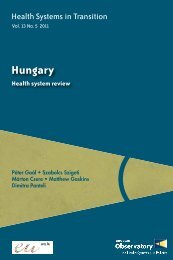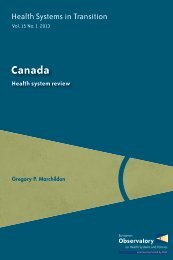risk factors impacting on the spread of hiv among pregnant women ...
risk factors impacting on the spread of hiv among pregnant women ...
risk factors impacting on the spread of hiv among pregnant women ...
Create successful ePaper yourself
Turn your PDF publications into a flip-book with our unique Google optimized e-Paper software.
RISK FACTORS IMPACTING ON THE SPREAD OF HIV AMONG PREGNANT WOMEN IN THE RUSSIAN FEDERATION<br />
• Pregnant <strong>women</strong> seeking care at antenatal clinics No.9, No.68, No.8, No. 32 in St Petersburg<br />
with positive HIV test results. Interviews were c<strong>on</strong>ducted in <strong>the</strong> Mama+ centre <strong>on</strong> referrals from<br />
gynaecologists, in antenatal clinics or in o<strong>the</strong>r c<strong>on</strong>venient places.<br />
The Kaliningrad working group incorporated <strong>the</strong> staff <strong>of</strong> Kaliningrad District Centre for AIDS preventi<strong>on</strong><br />
and c<strong>on</strong>trol. The sub-sample was made up <strong>of</strong> <strong>women</strong> from <strong>the</strong> target group who registered<br />
as HIV-positive in July 2004-2006 while seeking care for pregnancy (first or subsequent):<br />
• Women admitted in labour to maternity home No.4 in Kaliningrad, whose HIV test at delivery<br />
was positive. Interviews were c<strong>on</strong>ducted in a special <strong>of</strong>fice.<br />
• HIV-positive <strong>women</strong> who were told about <strong>the</strong> project while receiving care from <strong>the</strong> gynaecologist<br />
and paediatrician at <strong>the</strong> AIDS Centre. Interviews were c<strong>on</strong>ducted in <strong>the</strong> Centre’s psychological<br />
recreati<strong>on</strong> room or in o<strong>the</strong>r c<strong>on</strong>venient places (cafes).<br />
The Yekaterinburg working group incorporated <strong>the</strong> staff <strong>of</strong> Yekaterinburg District Centre for AIDS<br />
Preventi<strong>on</strong> and C<strong>on</strong>trol (manager, epidemiologists, psychologist and nurse). The sub-sample was<br />
made up <strong>of</strong> <strong>women</strong> from <strong>the</strong> target group who registered as HIV-positive in July 2004-2006 while<br />
seeking antenatal care (first or subsequent pregnancy):<br />
• HIV-positive <strong>women</strong> registered with <strong>the</strong> AIDS Centre, including those using <strong>the</strong> paediatrician’s<br />
services. Interviews were c<strong>on</strong>ducted in <strong>the</strong> Centre in a separate room.<br />
• Women admitted in labour to <strong>the</strong> Yekaterinburg observati<strong>on</strong> maternity hospital and whose HIV<br />
test at delivery was positive. Interviews were c<strong>on</strong>ducted in specially designated settings.<br />
• HIV-positive <strong>pregnant</strong> <strong>women</strong> attending a special pregnancy school run by <strong>the</strong> NGO<br />
“Sodruzhestvo -ХХI century”. Interviews were c<strong>on</strong>ducted in <strong>the</strong> school.<br />
The Irkutsk working group incorporated <strong>the</strong> staff <strong>of</strong> Irkutsk District AIDS Centre and <strong>the</strong> NGO<br />
“Anti-HIV Priangarye: Preventi<strong>on</strong> and support”. The sub-sample was made up <strong>of</strong> <strong>women</strong> from <strong>the</strong><br />
target group who registered as HIV-positive in July 2004-2006 while seeking antenatal, delivery or<br />
postnatal care:<br />
• HIV-positive <strong>women</strong> registered with <strong>the</strong> AIDS Centre, including those <strong>on</strong> ART, as well as <strong>women</strong><br />
with ne<strong>on</strong>ates, followed up by <strong>the</strong> paediatricians <strong>of</strong> <strong>the</strong> Centre. Interviews were c<strong>on</strong>ducted in <strong>the</strong><br />
Centre or in <strong>the</strong> resp<strong>on</strong>dents’ homes.<br />
• HIV-positive <strong>women</strong> admitted to medical facilities and maternity hospitals in Irkutsk. Interviews<br />
were c<strong>on</strong>ducted in “trust rooms” at those facilities.<br />
• HIV-positive <strong>women</strong>, <strong>pregnant</strong> or with infants, followed up by <strong>the</strong> NGO “Anti-HIV Priangarye:<br />
Preventi<strong>on</strong> and support”. 4 Interviews were c<strong>on</strong>ducted in <strong>the</strong> premises <strong>of</strong> <strong>the</strong> NGO, in resp<strong>on</strong>dents’<br />
homes, or in o<strong>the</strong>r c<strong>on</strong>venient places.<br />
4 NGO "Anti-AIDS-Priangarye: Preventi<strong>on</strong> and support" provides psychological and legal counseling for HIV-positive <strong>pregnant</strong> <strong>women</strong> and<br />
mo<strong>the</strong>rs, supplies baby foods, vitamins, etc.<br />
13
















